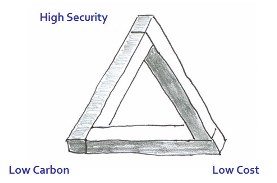The Energy Trilemma
Policy advisers are seeking high energy security, low carbon emissions and low prices for heating and cooling.
BEIS wants to escape from the image of being held to ransom by the need to import gas from unstable states. The fear of lights going out haunts the politicians. Everyone recognises the need to move to a low carbon economy. The Treasury does not want to meet the costs in a time of austerity. These objectives are seen as irreconcilable – symbolised by an image of an Escher triangle that would be impossible to construct.
Energy Trilemma Solution
However, heating and cooling can be provided by heat transfer – with no emissions of carbon on-site. Heat transfer using heat pumps is cheaper than burning fossil fuels for heating, or employing roof mounted chillers for cooling. And the energy ultimately comes from the sun, not from imports.
Decarbonisation of the grid requires reducing combustion of fuels.
Decarbonisation of the grid means renewable electricity generation from wind and solar.
Decarbonisation of the grid points to electrification of heat.
Electrification of heat implies the use of heat pumps to transfer heat from where it is available to where it is needed.
Heat Energy storage implies using ground source heat pumps to take advantage of the ground as a natural store of heat energy between summer and winter.
The search for a practical and affordable way to reduce carbon emissions continues. Governments all recognise the need to control the emissions of carbon. The Pope and the Governor of the Bank of England have also voiced concern that the issue is critical, but little progress has yet been made.
Action to curb carbon emissions requires action by Government
It is easier to recognise the problem of global warming than to know what to do about it. The UK Government has allowed itself to be persuaded that the carbon emission problem is secondary to the fight to control public spending because without control of public spending the Government will have limited power to do anything constructive. The Government is in danger of ignoring the implications of climate change on the Government's future finances, including the need for larger spending on health and welfare.
However, investment in renewable energy by companies and individuals is currently a private cost which provides a public benefit. Until the government recognises the value of private investment in renewable energy by action instead of just words the problem of increased CO2 in the atmosphere will not be addressed seriously.
Renewable Energy can be divided into Renewable Electricity and Renewable Heat: these two manifestations of energy need to be treated in different ways.
The most promising approach to reducing carbon emissions from heat is to arrange for the transfer of heat from the time of abundant supply (summer) to the time of need (winter). It is cheaper and more efficient to transfer heat when it is needed instead of paying to generate heat each time heat is needed. Heat pumps can be used to transfer heat out of buildings into thermalbanks in summer. They can also be used to transfer heat back from thermalbanks into buildings in winter.
There can also be opportunities to transfer heat from places of abundant supply (data centres or supermarkets) to places of need (like schools or hospitals). This can be achieved where the excess heat is reasonably close to the demand – and information and an infrastructure is accessible so that the transfer can be organised and controlled.
Energy Trilemma Resolution
There is a way of resolving the energy trilemma: it can be achieved by the integration of:
- heat pumps
- thermal energy storage in the ground
- heat sharing networks
- electrification of heat
- electric load balancing
- decarbonisation of the grid
Low Carbon Economy
If society wants to achieve a low carbon economy then government must act to encourage companies and citizens to reduce combustion. This can be achieved by
- increasing carbon taxes
- increasing the incentives for Renewable Heating
- introducing incentives for Renewable Cooling
- requiring the use of low carbon technologies via planning permission.
See Ground Source Heating See Ground Source Cooling See Ground Source Energy

